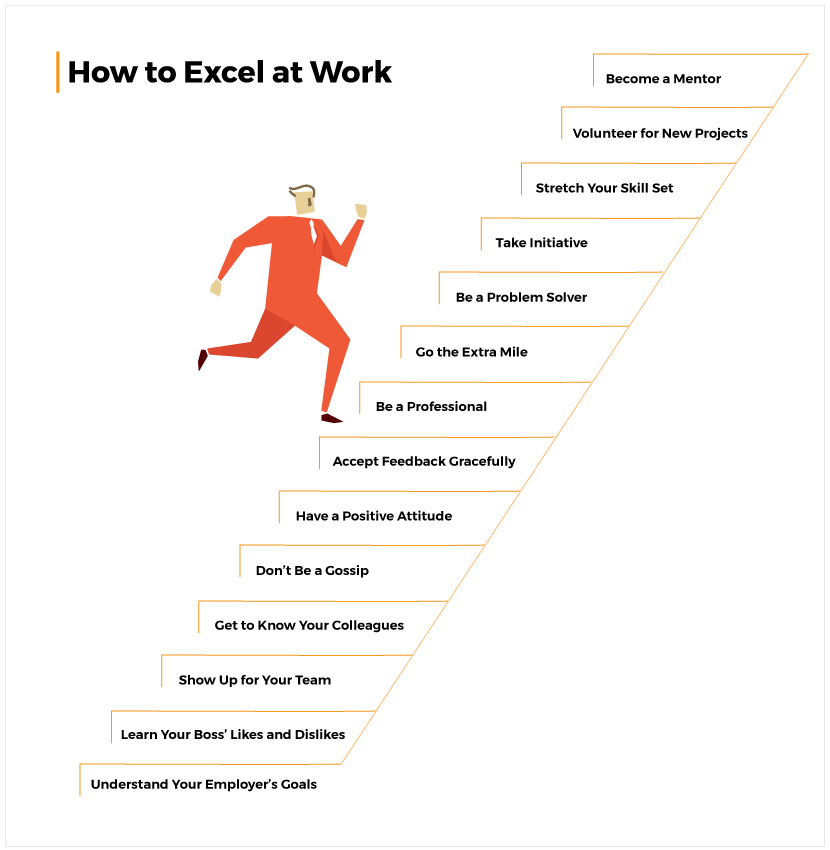How to Excel at Work: 14 Proven Ways to Impress Your Boss
If you want to learn how to do great work, but don’t know where to start, we have 14 proven tips to help you establish professional goals and excel at your job.
If you’ve ever wondered how to truly excel at work, you’re not alone. Maybe you’re feeling stuck, trying to prove yourself in a new role, or simply unsure how to move forward. The good news? Excelling at work doesn’t require perfection, it just takes the right mindset, a few smart strategies, and consistent action. Whether you're aiming for a promotion or just want to feel more confident in your day-to-day life, these 14 tips can help you show up, stand out, and succeed.
14 Tips to Excel at Work
1. Understand your employer’s goals.
Many people work for years without truly understanding what their company is trying to achieve, and that’s what holds them back. To excel at work, you first need to know your employer’s big-picture goals and how your role contributes to them.
Start by asking:
- What are the company’s main objectives this quarter or year?
- How does my team fit into those goals?
- What can I do to make a bigger impact?
Talk to your manager or experienced coworkers to get their perspective. And pay attention to who’s getting promoted and what they are doing differently. If you’re not sure, ask them directly. Their insight could reveal a clear path to growth for you, too.
2. Learn what your boss values.
Pay attention to your manager’s preferences, priorities, and pet peeves. Do they value speed or thoroughness? Do they appreciate proactive communication or minimal updates? The more you align your work style with what your boss expects, the more likely they are to notice and appreciate your contributions.
Take advantage of your one-on-one meetings to ask for direct feedback on ways you can improve your work. Take notes and apply them! Treat your regular check-ins as progress reports. This way, you have verifiable proof of your growth and will help you approach a topic of an internal promotion with facts and confidence.
3. Show up for your team.
Everyone talks about being a “team player,” but what does that really mean? At its core, it’s about understanding what your team values and showing that you’re willing to support those values with your actions.
Start by observing what matters most to your coworkers. Is it reliability, clear communication, willingness to pitch in? When you align with those priorities—whether by staying late to help, covering a shift, or simply being dependable—you build trust and credibility.
Being a strong team player not only earns your colleagues’ respect, but it’s also a powerful soft skill that hiring managers love to see on a resume.
4. Get to know colleagues beyond your team.
People who truly excel at work don’t just stick to their own department, they build strong relationships across the organization. These cross-functional connections make collaboration easier, reduce friction, and help projects move forward more smoothly.
While department silos can lead to miscommunication or even internal competition, being someone who bridges the gaps can set you apart. When you’re trusted and respected by colleagues across teams, you’ll be able to solve problems others can’t, and leadership will notice. Employers value team harmony, and relationship-builders help make it happen.
5. Don’t be an office gossip.
It’s hard to be a bridge builder when you’re part of office gossip. A golden rule to excel in your career is to stay away from gossiping and rumors at work. No matter how good an employee you may be, getting caught in office drama will quickly downgrade your standing with your boss and your company. It will also take you away from focusing on how to excel at your work. Stay above the fray and don’t participate in gossip or drama.
6. Have a positive attitude.
If you’re doing everything right and feel like you can’t fully excel at work, think about your attitude at work. The energy you bring to the workplace is half of the recipe for succeeding at work. Positivity is contagious. It lifts morale and creates a more enjoyable work environment.
Be the person who brightens the office with an upbeat, can-do attitude. Supporting your colleagues and maintaining optimism not only makes you more likable but also puts you as a positive reference in people’s mind, and colleagues will want to go to you when brainstorming ideas or projects. Cultivating a positive mindset can open doors and help you advance your career.
7. Accept feedback gracefully.
Although it can be tough, handling constructive criticism well is key to excelling at work. Instead of taking feedback personally, use it as a roadmap to improve your skills and performance.
Here’s how to make the most of feedback:
- Listen carefully without interrupting or getting defensive.
- Ask clarifying questions if you’re unsure about what to improve.
- Take notes so you can refer back and create an action plan.
- Set specific goals based on the feedback and track your progress.
- Follow up with your manager after making changes to show you’re committed.

8. Be a true professional.
If you’re starting a new job and you want to prove you can excel in the role, stay true to the standards of good professionalism. Being professional goes far beyond just showing up and doing your job, it’s about how you carry yourself, communicate, and contribute every day.
Professionals who excel in a role consistently demonstrate these traits:
- They accept feedback with maturity and use it to improve.
- They treat others with respect, regardless of role or opinion.
- They communicate clearly and courteously, even in tough situations.
- They take responsibility, meet deadlines, and speak up early if a goal might be missed.
- They take pride in their work, aiming to meet or exceed company standards.
- They show up prepared, dress appropriately, and represent the company well.
Professionalism builds trust. It sets you apart as someone who can be relied on beyond doing the bare responsibilities.
9. Go the extra mile.
Going the extra mile means consistently putting in the effort to exceed expectations, not for recognition, but because you take pride in your work. It’s about being the person your team and manager can count on, especially when it matters most.
Excelling at work can look like staying a little late to finish a task, volunteering to support a coworker under pressure, or double-checking your work to make sure it’s excellent—not just complete. Offer to help with a last-minute deadline, say yes to a task outside your usual scope, or follow through when others might let things slide.
Going above and beyond builds trust and shows you’re reliable, invested, and driven, which are qualities every manager values.
10. Be a problem solver.
Anyone can spot problems, but people who excel at work focus on finding solutions. Instead of pointing out what’s wrong and stopping there, take the next step: think critically, ask smart questions, and offer actionable ideas that move things forward.
Being a problem solver means listening carefully, understanding the full context of an issue, and approaching challenges with a mindset of improvement, not blame. If you see a recurring issue or inefficiency, suggest a fix or, better yet, offer to help implement it. Don’t wait for someone else to ask.
When appropriate, make decisions independently to resolve smaller issues. Your manager will appreciate that you’re not only capable, but also proactive and solutions-oriented. These are the traits that build trust and get you noticed when it’s time for promotions or leadership opportunities.
11. Take initiative.
Have an idea to streamline a clunky process? Noticed a gap your team hasn’t addressed? Thought of a new tool or workflow that could save time? If so, share your ideas with your manager, come prepared with possible solutions, and volunteer to test or implement them when you can.
Professionals who excel at work are innovators who are constantly trying to improve processes at work. Don’t be shy about proposing solutions and improvements; go out and make them happen.
12. Update your skill set.
When thinking about how to excel at work, consider taking the initiative to learn new skills or deepen your expertise. Don’t wait for someone to tell you what skills to build. Identify gaps on your team or in your role, and start filling them.
Whether it’s mastering a new tool, strengthening your communication skills, or learning basic project management, developing in-demand abilities makes you more valuable and versatile.
13. Volunteer for new projects.
Volunteering for new projects is a powerful way to show initiative and excel in work. New projects challenge you to learn, collaborate, and demonstrate your skills in fresh contexts. Doing these types of projects not only boosts your job satisfaction but also leads to stronger performance reviews and opens doors to exciting opportunities. Plus, the experience and accomplishments you gain become valuable additions to your resume, helping you stand out in future job searches.
Here are some ways to volunteer effectively:
- Offer to lead or assist with a team project that’s outside your usual duties.
- Volunteer to organize meetings, training sessions, or company events.
- Help troubleshoot issues or improve processes in your department.
- Take on a pilot program or new software implementation.
- Mentor a new employee or lead knowledge-sharing sessions.
14. Become a mentor.
A great way to demonstrate how well you do your job is to volunteer to mentor new hires. Not only will your coworkers appreciate the gesture, but teaching new workers how to excel at work by teaching them all of the tricks of the trade will also endear you to them right from the start.
In addition, mentoring can help you improve your job performance. While mentoring can be time consuming, it is often also very satisfying. Plus, when you are teaching others how to do their jobs, you may discover holes in your knowledge or skill set as you answer mentee questions. Identifying these gaps and addressing them will help you become better at your job.
Now that you know what it takes to truly excel at work, why don’t you consider updating your resume? You’ll need a fresh resume if you’re going to apply for an internal position or move on to a new stage in your career.
The best and fastest way to write a professional resume is with our Resume Builder. Type in your desired job title and years of experience, and watch the magic happen!
Frequently Asked Questions
What are some examples of things I do well at work?
Examples of things you might do well at work include meeting deadlines consistently, communicating clearly with your team, showing initiative by volunteering for new projects, solving problems proactively, and maintaining a positive attitude even under pressure. Highlighting these strengths in your self-assessment or performance reviews can help you demonstrate your value to your managers.
What does it mean when something is going well at work?
When something is going well at work, it means you are meeting or exceeding your job expectations, feeling engaged and productive, collaborating effectively with colleagues, and contributing positively to team goals. Recognizing these moments helps you understand your strengths and areas where you can continue to grow.
How can I excel in my career?
Excelling in your career involves a combination of continuous learning, taking initiative, building strong professional relationships, accepting feedback gracefully, and consistently delivering quality work. Setting clear goals, seeking new challenges, and expanding your skill set are also essential to long-term success.
How do I know if I would excel in this position?
To determine if you would excel in a position, assess how well your skills, experiences, and interests align with the job requirements. Consider your enthusiasm for the role’s responsibilities and whether you’re motivated by its challenges. Also, reflect on your past achievements in similar roles and your ability to adapt and learn quickly.
How can I cope with overload at work?
Coping with work overload requires prioritizing tasks, setting realistic deadlines, and communicating openly with your manager about your capacity. Break large projects into smaller steps, delegate when possible, and take regular breaks to avoid burnout. Learning to say no or negotiate deadlines is also crucial to maintaining balance.
Why am I not liked at work?
Feeling disliked at work can stem from various factors such as communication styles, misunderstandings, or workplace dynamics. Reflect on your interactions, seek feedback, and try to build rapport through active listening and empathy. Sometimes, workplace culture or external stressors contribute to tension, so focusing on professionalism and positive behavior can improve your relationships over time.
How can I survive a job I hate but can't leave yet?
Surviving a job you dislike involves finding small ways to make your workday more manageable, such as setting clear boundaries, focusing on tasks you enjoy, and seeking support from trusted colleagues. Use this time to build skills, network, and plan your next career move. Maintaining a positive attitude and practicing self-care outside of work can also help you cope.
What are the key habits of people who excel at work?
People who excel at work tend to be proactive, reliable, communicative, and open to feedback. They continuously develop their skills, collaborate well with others, and take ownership of their tasks. Consistently going beyond the minimum requirements and adapting to change are also common habits of high achievers.
How do I use Excel at work effectively?
Microsoft Excel is a powerful tool for organizing data, performing calculations, and creating reports. To use Excel effectively, learn essential functions such as formulas, pivot tables, and data visualization tools. Applying Excel skills can improve your productivity and help you analyze information to make better decisions.















